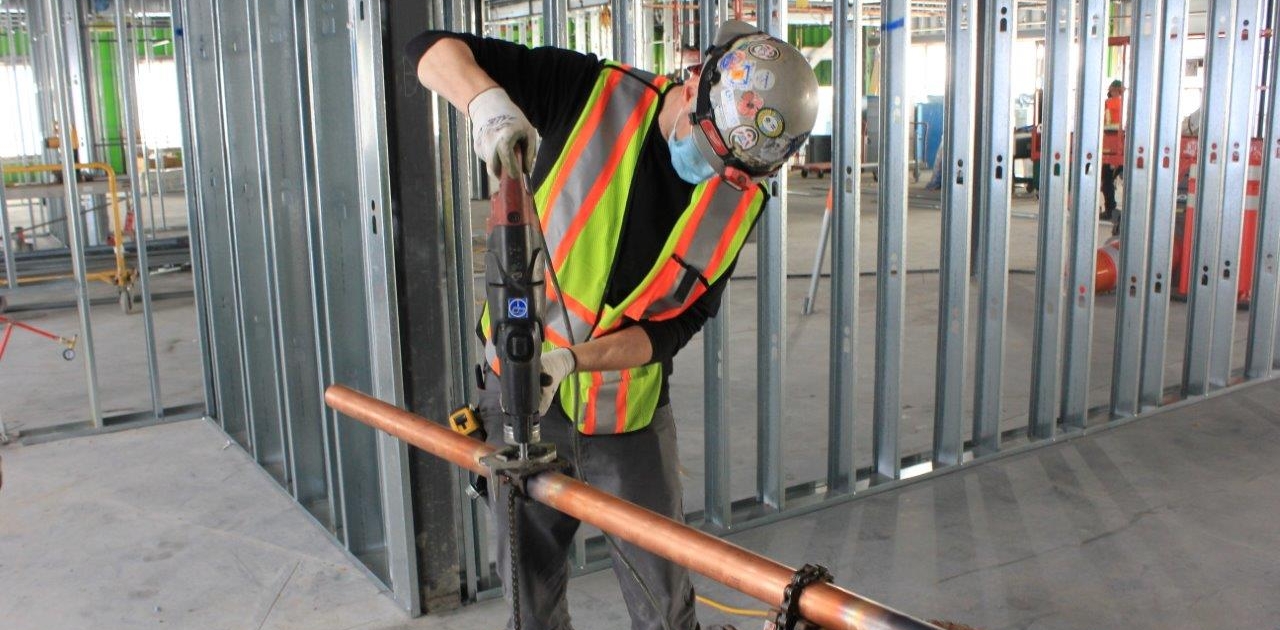Plumbers enjoy a multi-faceted trade installing, repairing and maintenance and service of piping and plumbing systems and equipment used for drinking water distribution, sanitary storm water systems, and waste disposal for the health and safety of the general public.
Plumbers work mostly in the new home building and renovation industry, high rise, industrial, institutional and commercial construction sectors including hospitals schools and other institutional buildings.
Job Description
People think of a plumber in the domestic sense, only as a person who installs and fixes faucets, drains and bathroom fixtures. However, plumbing is a multi-faceted trade with applied skills, for example in hospitals, commercial buildings, manufacturing plants, houses, apartments and process piping. As a Plumber, one designs and installs above and below ground potable water systems, installs above ground sanitary storm and waste systems, pumps and water treatment systems, and, of course, installs sinks and bathroom fixtures in homes as well as process piping, gas piping, and related equipment. They also work on technical installations for Medical Gas, Hydronic in-floor heating, and many facets of “Green” technology including Solar Panels, Heat Pumps, Cross Connection Control and many other systems that are crucial to the health and safety of the general public, but are not always evident to the consumer.
Training
Training to become a Plumber is available through a union apprenticeship program offered by the United Association of Journeypersons and Apprentices of the Plumbing and Pipefitting Industry of the United States and Canada.
The application process to become a part of the union includes in most jurisdictions in Canada that you must be at least 16 years of age and have a minimum Grade 12 education. Plumbing is a complex, analytical trade, and taking courses in mathematics and science, as well as having good oral and writing skills, are necessary in preparing yourself for a career as a Plumber. An apprentice is someone who learns a trade by working under the guidance of a qualified Journeyperson in the trade so they “learn while they earn”. The skills that are developed under this arrangement have been a proven model for the trades since the 1400’s when the apprenticeship model began. Learning skills from a person that has completed their trade is still the best way to become a master at your craft. The apprentice also has to attend training at a registered apprenticeship program delivery agent and learn the theoretical skills required for the position. You get paid by the hour while working on the job site. See our salaries link for more information.
Payback
Apprenticeship is both an ancient tradition and a highly effective modern training method, proving to still be the best system for trades training. This is a highly rewarding career path for an individual who is motivated to learn the piping trade and become an active member of a proud and noble trade union. The rewards of Union Apprenticeship Training are the good wages and benefits you receive as a skilled craftsperson. You’ll be working under the protection of a union contract with insurance, pension and health and welfare benefits. In the long run, it pays to become a Plumber, trained through Union Apprenticeship!
Ready to start a new career? Contact the UA today!


